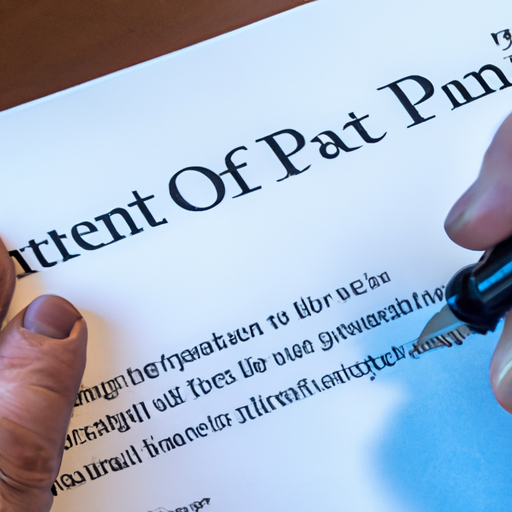As a business owner, protecting your intellectual property is crucial to safeguarding the unique ideas and creations that drive your success. Intellectual property law can be complex and intimidating, but with the help of an experienced and knowledgeable lawyer, you can navigate this intricate field with confidence. Our team of intellectual property lawyers in Richmond, Utah specializes in providing comprehensive legal counsel to businesses and entrepreneurs facing IP challenges. With a deep understanding of the needs and concerns of individuals in this field, we are committed to offering informative and accessible posts that demystify complex legal concepts. Through engaging case studies and real-life scenarios, we aim to instill confidence and set our practice apart from the rest. By incorporating personal stories, we seek to create emotional connections and humanize our services. So if you find yourself facing IP issues, don’t hesitate to take the next step and give us a call. Allow us to assist you promptly and provide the guidance and reassurance you need.
Overview of Intellectual Property Law
Intellectual property law is a branch of law that deals with the protection of intangible assets, also known as intellectual property (IP). This area of law encompasses various legal frameworks and regulations that aim to safeguard the rights and interests of creators and innovators. Intellectual property protection plays a crucial role in promoting innovation, creativity, and economic growth by providing legal rights to individuals and businesses for their inventions, designs, branding, and artistic works. An intellectual property lawyer specializes in this field and provides clients with expert guidance and representation in matters related to intellectual property.
Introduction to Intellectual Property Law
Intellectual property law refers to the legal framework that governs the rights and protection of intangible assets, including inventions, trademarks, copyrights, and trade secrets. It is designed to encourage and reward innovation and creativity by granting exclusive rights to individuals and businesses over their intellectual property. The laws and regulations related to intellectual property vary from country to country, but they generally aim to provide creators and inventors with the ability to control and commercialize their innovations and creative works.

The Importance of Intellectual Property Protection
Intellectual property protection is essential for creators, inventors, and businesses for several reasons. First and foremost, it provides them with exclusive rights to profit from their creations and inventions, which incentivizes innovation and encourages economic growth. Without such protection, there would be little motivation for individuals and businesses to invest time, resources, and effort into developing new ideas and products.
Additionally, intellectual property protection helps in maintaining a competitive advantage in the marketplace. By safeguarding their unique innovations, brands, and designs, businesses can prevent others from copying or imitating their products or services. This protection enables businesses to differentiate themselves from competitors and establish a distinct identity in the market.
Intellectual property protection also fosters creativity and encourages the dissemination of knowledge. When creators and inventors know that their intellectual property rights will be protected, they are more likely to share their ideas and innovations with the public. This sharing of knowledge and ideas contributes to the advancement of society as a whole.
Types of Intellectual Property
There are several types of intellectual property that can be protected under the law. These include:
1. Trademarks
Trademarks are distinctive signs, such as logos, names, or symbols, that are used to distinguish the goods or services of one company from those of others. Trademark protection ensures that consumers can identify and associate a specific brand with its quality and reputation.
2. Copyrights
Copyrights protect original artistic, literary, and creative works, such as books, music, paintings, films, and computer software. This protection grants the creator exclusive rights to reproduce, distribute, display, and perform their work for a specified period.
3. Patents
Patents are granted for inventions that are new, useful, and non-obvious. They provide inventors with exclusive rights to their inventions, preventing others from making, using, or selling the patented invention without permission.
4. Trade Secrets
Trade secrets encompass valuable and confidential business information, such as formulas, manufacturing processes, customer lists, and marketing strategies. Unlike other forms of intellectual property, trade secrets are protected through maintaining secrecy and ensuring adequate measures are in place to prevent unauthorized disclosure.

The Role of an Intellectual Property Lawyer
An intellectual property lawyer plays a crucial role in assisting individuals and businesses in navigating the complex landscape of intellectual property law. These lawyers specialize in the various legal aspects of intellectual property, including registration, protection, enforcement, and litigation. By hiring an intellectual property lawyer, clients can benefit from their expertise and experience in managing intellectual property matters effectively.
The services provided by an intellectual property lawyer can vary based on the specific needs of the client. Some common services offered by these lawyers include:
Trademark Registration and Protection
An intellectual property lawyer can help clients register their trademarks and protect them from infringement. They can conduct thorough searches to ensure the proposed trademark does not infringe upon the rights of others and guide clients through the registration process.
Copyright Registration and Infringement
Copyright registration can provide additional protection and benefits to creators. An intellectual property lawyer can assist in the copyright registration process and offer advice on preventing and addressing copyright infringement issues.
Patent Application and Prosecution
Obtaining a patent for an invention can be a complex and lengthy process. An intellectual property lawyer can guide inventors through the application and prosecution process, ensuring that their inventions are adequately protected.
Trade Secret Protection
Protecting trade secrets is crucial for businesses to maintain their competitive advantage. An intellectual property lawyer can draft and review non-disclosure agreements and implement policies to safeguard valuable confidential information.
IP Portfolio Management
An intellectual property lawyer can help clients effectively manage their intellectual property portfolio, including overseeing renewals, monitoring infringement, and providing strategic advice on monetizing intellectual property assets.
Benefits of Hiring an Intellectual Property Lawyer
Hiring an intellectual property lawyer can provide significant benefits to individuals and businesses seeking to protect their intellectual property. Some key benefits include:
Expertise and Experience in IP Law
Intellectual property lawyers specialize in the field of intellectual property law and possess in-depth knowledge and experience. They stay updated with the latest developments and changes in the law, allowing them to provide accurate and informed advice to their clients.
Guidance and Advisement on IP Strategies
An intellectual property lawyer can help clients develop effective strategies to protect and maximize the value of their intellectual property assets. They can provide advice on licensing, technology transfers, brand management, and other aspects of intellectual property commercialization.
Enforcement of Intellectual Property Rights
If intellectual property infringement occurs, an intellectual property lawyer can take legal action on behalf of their clients. They can initiate lawsuits, send cease and desist letters, and negotiate settlements to enforce their clients’ rights and seek appropriate remedies.
International IP Protection
For businesses operating in multiple jurisdictions, an intellectual property lawyer can provide guidance on protecting intellectual property rights internationally. They can assist in filing international trademark applications, navigating foreign copyright laws, and enforcing intellectual property rights in foreign jurisdictions.
Intellectual Property Disputes and Litigation
Despite best efforts, intellectual property disputes can arise. It is essential to be prepared and understand the potential challenges that may be encountered. Some common disputes in intellectual property matters include:
Common Disputes in IP Matters
- Trademark infringement claims
- Copyright infringement claims
- Patent infringement disputes
- Trade secret misappropriation cases
- Breach of licensing agreements
Resolution of IP Disputes and Litigation Process
Intellectual property disputes are typically resolved through negotiation, mediation, or litigation. Negotiation and mediation provide opportunities for parties to reach mutually beneficial settlements, while litigation involves taking the dispute to court for a judge’s decision.
Damages and Remedies in IP Litigation
In successful intellectual property litigation cases, various remedies and damages may be awarded to the prevailing party. These can include monetary damages, injunctive relief (court orders preventing further infringement), and in certain cases, punitive damages.
Frequently Asked Questions about Intellectual Property Law
Q: What is the duration of copyright protection?
A: Copyright protection typically lasts for the life of the author plus 70 years. However, the duration may vary depending on the jurisdiction and the type of work.
Q: Can I patent a business method?
A: It is possible to obtain a patent for certain business methods if they meet the criteria of novelty, usefulness, and non-obviousness. However, the standards for patenting business methods can vary, so it is advisable to consult an intellectual property lawyer for guidance.
Q: What are the potential consequences of trademark infringement?
A: Trademark infringement can result in legal action, including injunctions, damages, and attorney fees. In severe cases, the court may order the infringing party to cease using the infringing mark and even destroy products or materials bearing the mark.
Q: How long does it take to obtain a patent?
A: The time it takes to obtain a patent can vary significantly. On average, it can take 2-3 years or longer, depending on factors such as the complexity of the invention, the backlog at the patent office, and potential examiner inquiries or rejections.
Q: What is the difference between a trademark and a copyright?
A: A trademark is a distinctive sign used to identify and distinguish goods or services, while copyright protects original artistic and creative works. Trademarks focus on brand recognition, while copyrights protect specific expressions of creative ideas.

Case Studies: Successful Intellectual Property Cases
Case Study 1: Protecting a Brand Identity
In this case, a company faced the challenge of competitors using a similar trademark to confuse consumers and dilute their brand identity. The intellectual property lawyer conducted a thorough trademark search and ultimately helped the company register their trademark. Subsequently, the lawyer issued cease and desist letters to the infringing parties, leading to successful settlements and the protection of the client’s brand.
Case Study 2: Defending Against Patent Infringement
A client received a notice alleging patent infringement by a competitor. The intellectual property lawyer reviewed the claims and conducted a comprehensive analysis of the patent in question. The lawyer successfully defended the client against the infringement allegations, demonstrating the differences between the patented technology and the client’s product.
Case Study 3: Resolving Trademark Disputes
Two companies, operating in different industries but with similar trademarks, found themselves in a dispute over potential consumer confusion. The intellectual property lawyer negotiated a coexistence agreement that allowed both companies to continue using their respective trademarks while implementing distinct marketing strategies to ensure clarity and minimize confusion among consumers.
How to Choose the Right Intellectual Property Lawyer
Choosing the right intellectual property lawyer is crucial for obtaining effective legal representation and protection of your intellectual property assets. Here are some factors to consider when selecting an intellectual property lawyer:
Consider the Lawyer’s Expertise and Specialization
Look for a lawyer who specializes in intellectual property law and has extensive experience in handling cases similar to yours. A lawyer with relevant expertise will be better equipped to address your specific needs and provide valuable guidance.
Review Client Testimonials and Case Results
Read client testimonials and review the lawyer’s past case results to assess their track record of success. This information can give you insights into the lawyer’s capabilities and their ability to achieve favorable outcomes for clients.
Evaluate Communication and Availability
Choose a lawyer who communicates effectively and is responsive to your inquiries. Intellectual property matters often have strict timelines and deadlines, so it’s crucial to work with a lawyer who can prioritize your case and provide timely updates.
Discuss Fees and Billing Structure
Before engaging an intellectual property lawyer, discuss their fees and billing structure to ensure it aligns with your budget and expectations. Some lawyers may offer alternative fee arrangements, such as flat fees or contingency fees, which can be more cost-effective for certain cases.
Importance of Intellectual Property Protection for Businesses
Intellectual property protection is of utmost importance for businesses, as it provides several key benefits:
Preserving Competitive Advantage
Intellectual property protection allows businesses to establish and maintain a competitive advantage in the market. By safeguarding their unique innovations, brands, and proprietary information, businesses can prevent competitors from capitalizing on their success and imitating their products or services.
Safeguarding Innovations and Creations
Intellectual property protection ensures that businesses can protect their valuable innovations and creative works. This protection encourages businesses to invest in research and development, knowing that their inventions and designs are shielded from unauthorized use.
Preventing Unauthorized Use and Misappropriation
Without intellectual property protection, businesses are vulnerable to various forms of infringement and misappropriation. Through trademarks, copyrights, patents, and trade secrets, businesses can deter and take legal action against those who attempt to exploit their intellectual property without permission.
Securing International Intellectual Property Rights
For businesses operating in a global marketplace, securing international intellectual property rights is crucial to protect their innovations and brands on an international scale. Here are some key considerations:
Overview of International IP Laws and Treaties
Different countries have their own intellectual property laws, regulations, and procedures. It is essential to have a clear understanding of the intellectual property laws in each jurisdiction where protection is sought. Additionally, international treaties, such as the Paris Convention for the Protection of Industrial Property and the WIPO Copyright Treaty, provide frameworks for international IP protection.
Steps to Protect IP Rights Globally
To secure international intellectual property rights, businesses should consult with an intellectual property lawyer who specializes in international IP law. The lawyer can assist in conducting comprehensive searches, filing international trademark applications, managing patent applications, and navigating the complexities of each jurisdiction’s intellectual property laws.
Enforcing IP Rights in Foreign Jurisdictions
Enforcing intellectual property rights in foreign jurisdictions can be challenging due to the varying legal systems and procedures. However, with the assistance of an experienced international intellectual property lawyer, businesses can take necessary legal actions to enforce their rights, such as filing infringement lawsuits or initiating dispute resolution mechanisms in the relevant jurisdictions.
Protecting Trade Secrets and Confidential Information
Trade secrets and confidential information play a critical role in the success of many businesses. Protecting these assets is crucial for maintaining a competitive edge. Here are some key considerations:
The Importance of Trade Secret Protection
Trade secret protection is essential for businesses to protect valuable confidential information, such as customer lists, manufacturing processes, and formulas. Trade secrets can provide a significant competitive advantage, and appropriate measures should be taken to prevent unauthorized disclosure or misappropriation.
Non-Disclosure Agreements and Trade Secret Policies
Businesses should establish comprehensive non-disclosure agreements (NDAs) with employees, contractors, and business partners to protect trade secrets and confidential information. A strong trade secret policy should be implemented to ensure that employees understand the importance of maintaining confidentiality and the consequences of trade secret misappropriation.
Litigation and Remedies for Trade Secret Misappropriation
In the event of trade secret misappropriation, businesses can take legal action to protect their rights and seek remedies. This may involve filing a lawsuit, obtaining injunctive relief to prevent further disclosure or use of the trade secret, and seeking damages for the loss suffered as a result of the misappropriation.
Frequently Asked Questions about Trade Secrets
Q: What qualifies as a trade secret?
A: Trade secrets can include a wide range of valuable information, such as formulas, methods, processes, customer lists, and marketing strategies. To qualify as a trade secret, the information must be treated as confidential, have independent economic value, and be subject to reasonable efforts to maintain its secrecy.
Q: Can trade secrets be protected indefinitely?
A: Unlike patents or copyrights, trade secrets can potentially be protected indefinitely as long as they remain secret and measures are in place to preserve their confidentiality. However, once a trade secret is publicly disclosed or independently discovered by others, it may no longer receive legal protection.
Q: What legal remedies are available for trade secret misappropriation?
A: Legal remedies for trade secret misappropriation typically include injunctive relief (court orders to cease the use or disclosure of the trade secret), monetary damages to compensate for the loss suffered, and potentially even punitive damages in cases of willful misappropriation.
Q: What steps should businesses take to protect trade secrets?
A: To protect trade secrets, businesses should implement comprehensive non-disclosure agreements, limit access to confidential information on a need-to-know basis, use physical and digital security measures, and educate employees on the importance of maintaining confidentiality.
Q: What should businesses do if they suspect trade secret misappropriation?
A: If a business suspects trade secret misappropriation, it is crucial to consult with an intellectual property lawyer who specializes in trade secret law. The lawyer can assess the situation, gather evidence, and advise on the appropriate legal remedies available to protect the business’s rights.
In conclusion, intellectual property protection plays a vital role in today’s competitive business landscape. By understanding the various aspects of intellectual property law and the services provided by an intellectual property lawyer, individuals and businesses can effectively protect and enforce their intellectual property rights. From trademark and copyright registration to resolving disputes and securing international IP rights, the guidance and expertise of an intellectual property lawyer are invaluable. By choosing the right lawyer and taking proactive measures to protect intellectual property assets, businesses can safeguard their innovations, brands, and trade secrets, ensuring a competitive edge and long-term success.























































